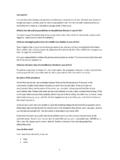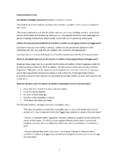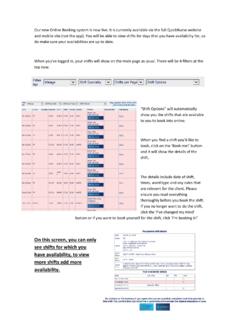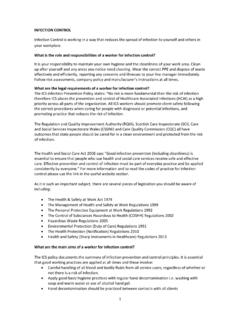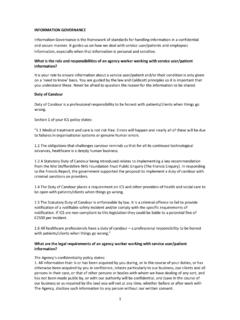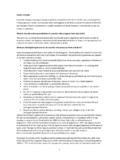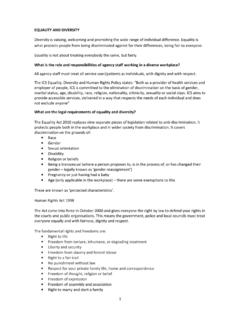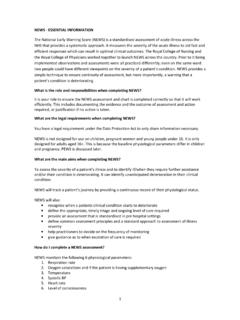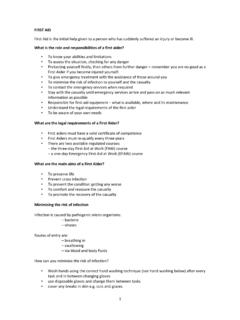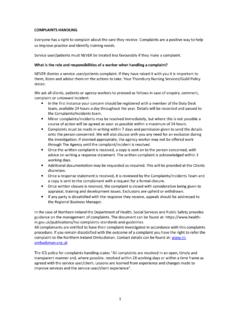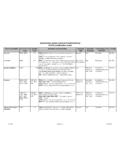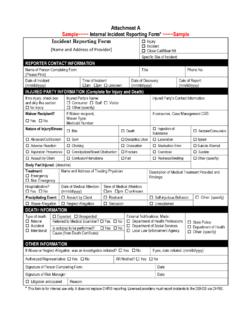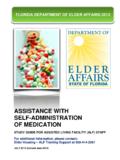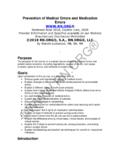Transcription of Administering Medication 2016 v2 - Quick Nurse - …
1 1 Administering Medication Agency nurses can administer any medicines or drugs that have been prescribed for the service user/patient by a qualified medical practitioner or Nurse prescriber, which includes legally controlled drugs. What is the role and responsibilities of a Nurse who administers Medication ? At the start of all assignments the agency Nurse must establish local policy and procedures with regards to the administration of Medication , however, within the domiciliary environment the patient s Medication plan, the Trusts policy and Thornbury Nursing Services/Guild policy must be followed. What are the legal requirements of a Nurse who administers Medication ? All registered nurses should be familiar with: NMC The Code: Professional Standards of Practice and Behaviour for Nurses and Midwives March 2015, NMC: Standards for Medicines Management 2007, Record Keeping Guidance is now covered in The Code.
2 All nurses must follow the (COSHH) Control of Substances Hazardous to Health Regulations (2002). Good practice in relation to these Regulations means nurses must: Ensure hazardous substances ( Medication ) is stored in a safe place Understand the actions to take if a spillage occurs Ensure Medication is not kept and stored after its shelf life Have a detailed knowledge about the substances in the Medication corrosive etc. Maintain accurate records of receipt of Medication , administration and disposal Ensure appropriate use of PPE as required The Misuse of Drugs Act 1971 governs controlled drugs, drugs that are liable to abuse. The Act states all transactions must be handled by appropriately trained staff and witnessed by another trained staff member. The Medicines Act 1968 defines medical products as substances sold or supplied for administration to humans for medicinal purposes.
3 As a Registered Nurse you are responsible for the initial and continued assessment of patients who are self- Administering and have continuing responsibility for recognising and acting on changes in a patient s condition with regards to the safety of the patient and others. In a service user/patients home where arrangements have been made for a parent, carer or service user/patient to administer their own medicinal products, as identified in the care plan, the Nurse should ascertain the service user/patient s participation in this agreement. For further advice you are reminded to contact the duty desk where a qualified Nurse is available 24 hours a day. What are the main aims of a Nurse who administers Medication ? To assist the service user to manage their Medication regime as effectively as possible by ensuring Medication is administered following the six rights 1.
4 Right patient 2 2. Right drug 3. Right dose 4. Right route 5. Right time 6. Right to refuse To monitor the condition of the service user/patient before, during and after Administering the Medication To document administration, refusal or omission of Medication To record any Medication errors made and escalate as appropriate To record any adverse reactions and escalate as appropriate Minimising the risk of infection ALWAYS wash your hands before preparing Medication . ALWAYS use a non-touch technique. Wear gloves and apron to protect both you and the service user/patient if provided. Follow standard infection control procedures. Establishing consent Whenever possible the service user/patient should be encouraged to administer their Medication . In accordance with The Mental Capacity Act (2005), before passing or Administering Medication always ask the service user/patient if they are ready and check what your role is.
5 Always ask the service user/patient for their consent for you to administer Medication . Consent can be verbal or indicated consent ( opening their mouth, holding out their hand) Privacy & Dignity Consider the service user/patients privacy and dignity at all times when Administering Medication . Also consider the other people around the service user/patient as they may also feel uncomfortable eye drops being given at a dining table. Administration checklist Before the administration of Medication nurses should check: The name of the service user/patient matches the name on the Medication You have the consent of the service user/patient The date Medication was dispensed The dose prescribed Time Medication is due Route prescribed Directions for use Any precautions Name of Medication Expiry date The service user/patients allergy status That Medication has not already been given All special precautions are adhered to an empty stomach, with food etc.
6 That the service user/patient has a drink of water available, if applicable 3 The service user/patient is in a safe position to have their Medication and their privacy and dignity is being upheld All these details should also be checked on the Medication Administration Record (MAR) or hospital Medication chart before Medication is administered. If in any doubt ask a colleague to double check with you. Administration by non-registered practitioners General levels of administration for non-registered practitioners (support workers) within the community setting should only occur once the appropriate training course has been completed. Level 1: General support also called Assisting with Medicine. General support is given with the person taking responsibility for their own medications.
7 In these circumstances the care worker will always be working under the direction of the person receiving the care. Level 2: Administrating Medications: The assessment of the service user may identify that they are unable to take responsibility for their medicines. This may be due to impaired cognitive awareness but can also result from a physical disability. Level 3: Administering Medication by specialised techniques. In exceptional circumstances in addition to oral medications, a non-registered care worker may be asked to administer medicines by a specialist technique including: Rectal Insulin by sub-cutaneous injection Administration through a gastrostomy Reporting & Recording All Medication administration must be recorded on a Medication Administration Record (MAR) or Hospital Medication chart.
8 Any changes, disposal, accident, error etc. must be reported immediately to the ward manager or shift leader and to the Duty Desk Team. Records must be legible, understandable, accurate, factual, up-to-date and signed. All records must respect the service user/patient. Remember the Data Protection Act 1998 gives service user/patients the right to access their records. Respect a service user/patient s decision if they decide they do not want to take their Medication , but explain to them the consequences of not taking the Medication . This will need to be documented and reported following the Trust s policy. If Medication has been administered incorrectly you must: Assess the service user s clinical status and respond to any changes immediately Follow the Trusts policy in a hospital environment or for the community follow the Individual Care Plan and TNS Policy Inform the senior Nurse or doctor immediately Record the mistake in detail Calmly and carefully inform the service user/patient Report to the Duty Desk Team ALL Medication ERRORS MUST BE REPORTED.
9 THIS MUST BE DONE IMMEDIATELY, BEFORE YOU FORGET THE EXACT DETAILS. For further advice you are reminded to contact the Duty Desk where a registered Nurse is available 4 24 hours a day. Storage of Medication In the acute sector Medication should be stored in a lockable cupboard and should always be locked when not in use. It should never be left unlocked and unattended. For Medication that needs to be stored in the fridge, there should be a separate lockable fridge to store these medications in. Controlled drugs should be stored in a separate lockable cupboard. In the community the service user is responsible for the storage of their medications. Agency workers can advise service users on safe storage, but the service user has the ultimate decision. Storage of Controlled Drugs in the Community In the community you should keep in mind the potential, but serious threat presented by the misuse of Controlled Drugs.
10 Service user/patients should be encouraged to keep Controlled Drugs in as secure an environment as possible. If a locked cabinet is available this should be used. In many circumstances this is unlikely to be available; in this instance Controlled Drugs should at least be kept out of sight and reach of children, pets and visitors. Disposal of Medication There are many reasons Medication may need to be disposed of a service user/patient may pass away, Medication may be changed, go out of date or be discontinued etc. Follow the Trust policy that you are working for to dispose of unwanted Medication . NEVER DISPOSE OF Medication DOWN THE TOILET, IN THE SHARPS CONTAINER OR IN HOUSEHOLD WASTE! Always record any disposal on the correct recording sheet. In the community all medications must be returned to the community pharmacy for disposal.
